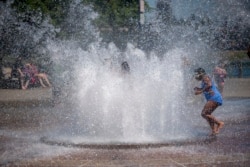High temperature records are being broken across the Pacific Northwest, as an extreme heat wave covers the area.
Portland, Oregon, reached 44.4 degrees Celsius Sunday. That broke the all-time temperature record of 42.2 degrees Celsius set just one day earlier.
In Eugene, Oregon, it was so hot that U.S. Track and Field cancelled Olympic trials Sunday afternoon. The National Weather Service (NWS) said it hit 43.3 degrees Celsius in Eugene, breaking the all-time record of 42.2 degrees Celsius. Those who had come to watch were also asked to leave the stadium because of the heat.
Oregon’s capital city, Salem, also recorded the highest temperature in its history on Sunday: 44.4 degrees Celsius. That broke the old record by 2 degrees.
The NWS has described the heat wave in the Pacific Northwest as dangerous, unusual and intense. The area rarely sees temperatures climb this high. The extreme heat was caused by an extended “heat dome” over the Pacific Northwest.
In Seattle, a city known for its rain, the temperature reached 40 degrees Celsius. The NWS said that was an all-time record. It was the first time temperatures were over 38 degrees Celsius for two straight days since records were first kept in 1894.
There were also some power outages. Portland General Electric said about 3,000 customers were without electricity in the city area Sunday afternoon. Puget Sound Energy reported 3,400 customers without power in the Seattle area.
Temperatures were expected to get even hotter across the region Monday, before beginning to cool Tuesday.
The heat wave stretched into British Columbia, Canada, which is just north of Washington State. In Lytton, British Columbia, temperatures hit 46.1 degrees Celsius. It was a new Canadian record.
A heat warning is in effect for most of Western Canada. The country’s weather agency says many daily temperature records have been broken across British Columbia.
Seattle’s King County closed several COVID-19 testing sites because of the heat. The Seattle Times reported that the city has opened additional public libraries to provide cooling centers. Sound Transit said that Seattle’s light rail trains may have to run at slower speeds because of high heat on the tracks.
The heat wave also moved into Idaho. Temperatures there reached above 38 degrees Celsius. They are expected to continue for at least seven days starting Monday.
Cities were telling citizens where pools and cooling centers were available. Officials were also urging people to drink a lot of water and avoid physically tiring activities.
Still, about 3,000 athletes took part in an Ironman Triathlon in Coeur d’Alene, Idaho, on Sunday. The event includes a 3.9-kilometer swim, a 180-kilometer bike ride and a 42-kilometer run.
The NWS in Coeur d’Alene said this week’s weather “will likely be one of the most extreme and prolonged heat waves in the recorded history of the Inland Northwest.”
Race organizers said they had 28,000 kilograms of ice to keep the athletes cool, KHQ-TV reported.
Stan Foster works in the Ironman medical area.
“The biggest thing that we tell people is, No. 1, don’t try to set a record on your race,” he said. “Go slow. Enjoy your day. It’s going to be hot.”
I’m Dan Novak.
Dan Novak adapted this story from reporting by The Associated Press. Susan Shand was the editor.
________________________________________________
Words in This Story
dome – n. a large rounded roof or ceiling that is shaped like half of a ball
outage — n. a period of time when there is no electricity in a building or area
library – n. a place where books, magazines, and other materials (such as videos and musical recordings) are available for people to use or borrow
triathlon— n. a long-distance race that has three parts (such as swimming, bicycling, and running)
prolonged — adj. lasting longer than usual or expected : continuing for a long time












